Traducteur bienvenu...
 |

Mise en scène de Derek Mahon
|
 |
Review by Philip Fisher
It is now often forgotten but Cyrano de Bergerac was a real man. A Seventeenth Century poet, wit, philosopher and swordsman, he wrote the excellent and now sadly neglected
Voyage to the Moon and the Sun.
A couple of centuries later, the young playwright Edmond Rostand recreated him as a tragi-comic fictionalised hero who, on occasion, has the
panache of a contemporary superhero and the generosity of Robin Hood. More recently, Antony Sher and Robert Lindsay here, and two heartthrobs, Jean-Paul Belmondo and Gerard Depardieu in his homeland, have graced the part. In Hollywood, even Steve Martin has had a go, opposite Daryl Hannah.
This new version of the play is part of the National Theatre's latest Travelex £10 season in which two-thirds of the seats cost that sum. One apparent consequence is that, while there is a large cast, multi-award-winning designer William Dudley's set is an economy version. Following the Peter Brook Empty Space principle, it consists of little more than a large piece of scaffolding on the Olivier's revolving stage. This is enhanced by John Bright's flamboyant late-Nineteenth Century costumes and Paul Anderson's adventurous and colourful lighting, together with a bit of dry ice.
Within these limited confines, director Howard Davies uses language, together with dance and Irish and French influenced folksy music, to relate the famous tale of the unbelievably large-nosed Cyrano de Bergerac's unrequited love for the beautiful Roxanne, played with sweet, if occasionally bland innocence by Claire Price.
She is a woman who turns almost every man's head, including not only the eponymous hero but also Malcolm Storry's dastardly Count and more significantly, the overly dull but handsome Christian played by Zubin Varla. It is to him that Cyrano lends his wit and poetry to win Roxanne, breaking his own heart in the process. The best and funniest scene in the production is one in which he trains his brainless protégé to woo the lady, with hilarious results.
Stephen Rea plays the title role with his own Irish accent and manages to combine wit, poetry and sadness with considerable success. He sports the traditional "glorious snout" beyond which Roxanne cannot see, until her moment of enlightenment at the play's tragic and very moving dénouement. Rea is at his best as an oppressed, depressed and love-lorn Cyrano, who chooses to make his beloved happy at his own expense.
In addition to the main actors, it is necessary to single out an excellent piece of comic character acting from Anthony O'Donnell as the poet-baker, Ragueneau.
Irish poet Derek Mahon's new version is modern to the extent of containing deliberately anachronistic allusions, often brash, and very uneven. Much of it is in rhyming couplets and at its best, particularly in a speech delivered by Rea that outlines Cyrano's freethinking philosophy, it can be very poetic and beautiful. Sometimes though, it misses quite badly. Despite many flashes of directorial wit, there is an overall feeling that both the script and the production might have benefited from a longer period of preparation.
Cyrano de Bergerac may not have managed the forty curtain calls that the play received on its first night in 1897. It does provide an entertaining, if sometimes flawed three hours.





